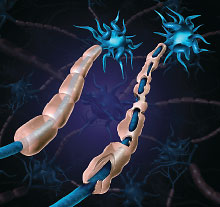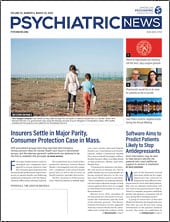Journal Digest: Events Before First-Episode Psychosis; Poor Neuron Insulation and Autism; Memory Suppression and Adaptation After Trauma
Threatening Events Common Before First-Episode Psychosis

Poor Neuron Insulation May Contribute to Autism

Memory Suppression May Help People Adapt After Trauma

Information & Authors
Information
Published In
History
Keywords
- first-episode psychosis
- psychosis risk
- schizophrenia
- threats
- violence
- threatening life difficulties
- Life Events and Difficulties Schedule
- intrusive events
- adverse life experiences
- autism spectrum disorder
- ASD
- myelin
- neuron
- impaired brain communication
- TCF4
- gene
- Pitt-Hopkins syndrome
- oligodendrocytes
- myelinated neurons
- brain tissue
- Brady Maher
- post-traumatic stress disorder
- PTSD
- 2015 Paris attacks
- exposure therapy
- resilience
- unwanted memories
- intrusive memory
- adaptively suppress memory activity
- disruption memory control system
- maladaptive unsuccessful suppression memory
- varenicline
- cardiovascular safety
- neuropsychiatric safety
- adverse events
- bupropion
- nicotine replacement
- prescription nicotine replacement therapies
- NRT
- smoking cessation
- pharmacotherapy
- FDA
- Boxed Warning
- insurance database
- MarketScan
- cardiovascular
- mindfulness
- cognitive-behavioral therapy
- internet-based intervention
- depression
- anxiety
- student mental health
- web-based mental health intervention
- Mindfulness Virtual Community
- college students
- University of Toronto
- youth-specific educational mindfulness-practice videos
- videoconferences
Authors
Metrics & Citations
Metrics
Citations
Export Citations
If you have the appropriate software installed, you can download article citation data to the citation manager of your choice. Simply select your manager software from the list below and click Download.
For more information or tips please see 'Downloading to a citation manager' in the Help menu.
View Options
View options
Login options
Already a subscriber? Access your subscription through your login credentials or your institution for full access to this article.
Personal login Institutional Login Open Athens loginNot a subscriber?
PsychiatryOnline subscription options offer access to the DSM-5-TR® library, books, journals, CME, and patient resources. This all-in-one virtual library provides psychiatrists and mental health professionals with key resources for diagnosis, treatment, research, and professional development.
Need more help? PsychiatryOnline Customer Service may be reached by emailing [email protected] or by calling 800-368-5777 (in the U.S.) or 703-907-7322 (outside the U.S.).
